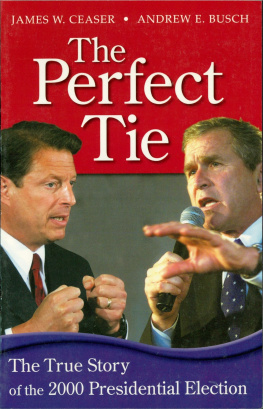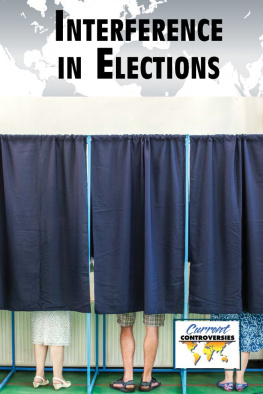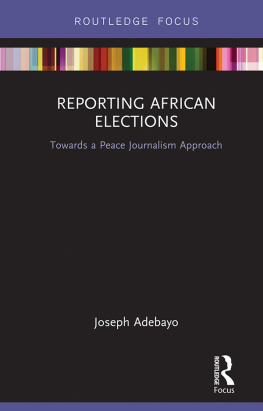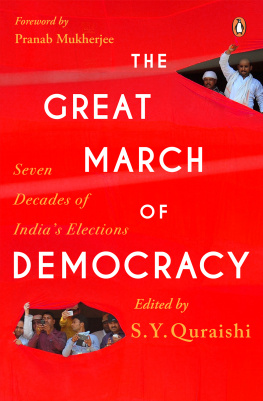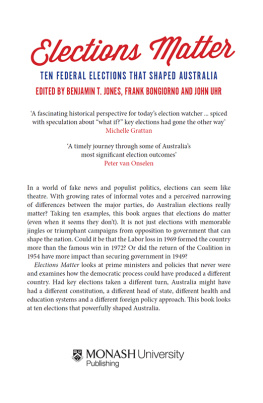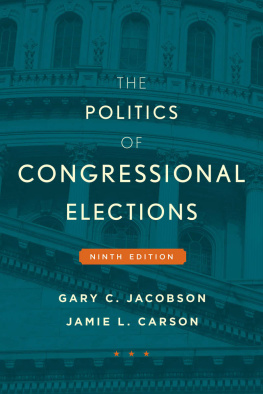Meddling in the Ballot Box

Oxford University Press is a department of the University of Oxford. It furthers the Universitys objective of excellence in research, scholarship, and education by publishing worldwide. Oxford is a registered trade mark of Oxford University Press in the UK and certain other countries.
Published in the United States of America by Oxford University Press
198 Madison Avenue, New York, NY 10016, United States of America.
Oxford University Press 2020
All rights reserved. No part of this publication may be reproduced, stored in a retrieval system, or transmitted, in any form or by any means, without the prior permission in writing of Oxford University Press, or as expressly permitted by law, by license, or under terms agreed with the appropriate reproduction rights organization. Inquiries concerning reproduction outside the scope of the above should be sent to the Rights Department, Oxford University Press, at the address above.
You must not circulate this work in any other form and you must impose this same condition on any acquirer.
Library of Congress Cataloging-in-Publication Data
Names: Levin, Dov H., author.
Title: Meddling in the ballot box : the causes and effects of partisan electoral interventions / Dov H. Levin.
Description: New York, NY : Oxford University Press, [2020] |
Includes bibliographical references and index.
Identifiers: LCCN 2020014309 (print) | LCCN 2020014310 (ebook) |
ISBN 9780197519882 (hardback) | ISBN 9780197519899 (paperback) | ISBN 9780197519929 (online) |
ISBN 9780197519905 (updf) | ISBN 9780197519912 (epub)
Subjects: LCSH: ElectionsCorrupt practices.
Classification: LCC JF1083 .L48 2020 (print) | LCC JF1083 (ebook) | DDC 324.9/045dc23
LC record available at https://lccn.loc.gov/2020014309
LC ebook record available at https://lccn.loc.gov/2020014310
Contents
When I look back at the intellectual debts, as well as the debts of gratitude, accumulated during the long process of writing this study I become very thankful that such debts arent monetary in nature. Had that been the case, I would need at least a few additional lifetimes to pay them all back.
My largest intellectual debts are to the three scholars at UCLA who generously lent their talents and time to this manuscript. First and foremost, they are to Arthur Stein. Without Arts highly discerning and perceptive feedback and suggestions on the draft versions of my arguments and various early draft chapters, the quality of the arguments made here in general, and of the manuscript in particular, would have been far poorer. Every time I left a meeting with him over one or another aspect, I came out feeling that I better understood what needed correction, how to correct it, and what I needed to do nexteven when his comments called, as they sometimes did, for the heavy revision or even abandonment of much of what we had just discussed.
Barbara Geddess feedback on the earliest versions of my arguments in her research design course saved me months of aimless wandering down blind methodological alleys. Her subsequent methodological and other feedback also helped to construct this work into a solid empirical house rather than a flimsy sand castle. Likewise, Robert Tragers trenchant comments and very helpful suggestions, both at the early stages of this manuscript and in its more recent near-final draft, were invaluable in improving its quality in all of its aspects and helping it reach its current form. I was truly very fortunate to have all three of these people in my committee.
Other scholars were also kind enough to carefully read and provide very useful feedback and comments on various early parts of this manuscript. Especially notable in this regard were Giacomo Chiozza, Deborah Larson, Benjamin Miller, Etel Solingen, Michael Thies, and Mark Trachtenberg. Special thanks in this regard is due to the late Mark Kleiman, who gave very valuable feedback and helped resolve a last-moment yet critical administrative problem. Likewise, Jeffrey Lewis, Christopher Tausanovich, and the staff at ATS provided important methodological help at multiple important points. These acts of intellectual kindness and charity are greatly appreciated.
While at UCLA I was also fortunate to meet an outstanding group of friends and colleagues who provided crucial early feedback on this project. Especially notable in this regard were Matthew Gottfried, Ron Gurantz, Or Honig, Chad Nelson, Jeff Paris, and Javier Rodriguez. Thank you all for your perceptive feedback.
Special thanks are due to Richard Hu and Uwe Steinhoff. As this manuscript was nearing completion I greatly benefited from a second round of feedback. At the University of Hong Kong I had an opportunity to conduct a book workshop with four of my colleaguesWilfred Chow, Courtney Fung, Enze Han, and Kai Quekwho read the manuscript and provided highly valuable feedback throughout. Other academic colleagues elsewhere were also kind enough to give very useful feedback on various parts of the near-final manuscript; these include Steve Chan, Andrew Enterline, Daniel Silverman, and Melissa Willard-Foster. Additional thanks are also due to Hovannes Abramyan. The manuscript is much improved thanks to their feedback.
Many thanks to Dave McBride and Holly Mitchell at Oxford University Press for their skillful guidance during the publishing process. I also thank the two anonymous reviewers of this manuscript. Thanks also to the project manager Anitha Jasmine and the copyeditor Debra Ruel for their professional production and copyediting of this manuscript. The manuscript has greatly benefited from their essential inpute.
In addition to the people mentioned, I am also indebted to a number of organizations and foundations for their generous financial support. A pre-doctoral fellowship from the Institute on Global Conflict and Cooperation helped speed up the completion of my PhD. A postdoctoral fellowship at the Institute for Politics and Strategy (IPS) at Carnegie Mellon University enabled me to start the lengthy process of expanding and revising this manuscript. Likewise, research funding from the Moody/LBJ Library Grant-in-Aid Award, the George C. Marshall/Baruch Fellowship, the General Research Fund (Early Career Scheme) by the Research Grants Council (grant number 27611719), and additional special assistance from IPS gave me much of the funds necessary for the multiple archival research trips that the data collection process for the PEIG dataset and the case studies that this book required.
I was fortunate to have encountered highly professional staff in all three of the political science departments I have been in. Special thanks in this regard go, at UCLA, to Joseph Brown; to faculty and staff at CMU; and at HKU to Sharon To, May Yim, and Daniel Tsang. An especially emphatic thanks for support throughout is to RSO. I also wish to sincerely thank the librarians and archivists in the various archives and libraries I went to for this manuscript (see Bibliography) for their patient assistance, the names of whom are too numerous to list here.
Earlier versions of some limited portions of this manuscript have been published before in When the Great Power Gets a Vote: The Effects of Great Power Electoral Interventions on Election Results, International Studies Quarterly 60, no. 2 (2016): 189202, and Partisan Electoral Interventions by the Great Powers: Introducing the PEIG Dataset,


